Publications: Weekly Reviews
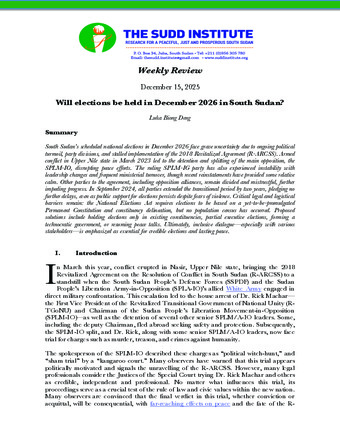
Will elections be held in December 2026 in South Sudan?
Author: Luka Biong Deng Kuol
Organization: The Sudd Institute
Type: Weekly Reviews
Date: 15/12/2025
South Sudan’s scheduled national elections in December 2026 face grave uncertainty due to ongoing political turmoil, party divisions, and stalled implementation of the 2018 Revitalized Agreement (R-ARCSS). Armed conflict in Upper Nile state in March 2023 led to the detention and splitting of the main opposition, the SPLM-IO, disrupting peace efforts.
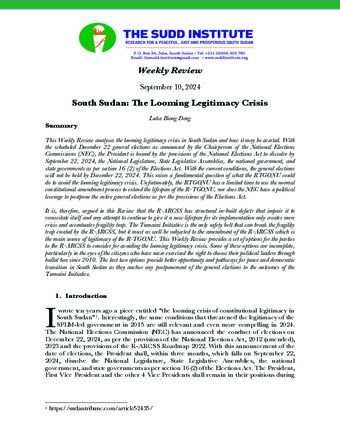
South Sudan: The Looming Legitimacy Crisis
Author: Luka Biong Deng Kuol
Type: Weekly Reviews
Date: 10/09/2024
This Weekly Review analyses the looming legitimacy crisis in South Sudan and how it may be averted. With the scheduled December 22 general elections as announced by the Chairperson of the National Elections Commissions (NEC), the President is bound by the provisions of the National Elections Act to dissolve by...
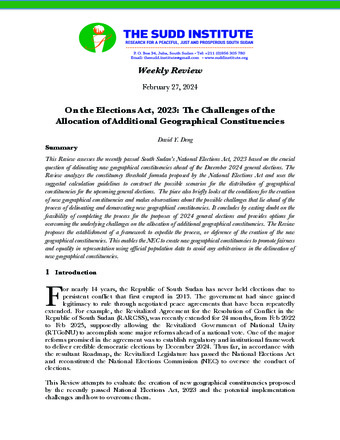
On the Elections Act, 2023: The Challenges of the Allocation of Additional Geographical Constituencies
Author: David Y. Deng
Type: Weekly Reviews
Date: 27/02/2024
This Review assesses the recently passed South Sudan’s National Elections Act, 2023 based on the crucial question of delineating new geographical constituencies ahead of the December 2024 general elections. The Review analyzes the constituency threshold formula proposed by the National Elections Act and uses the suggested calculation guidelines to construct...
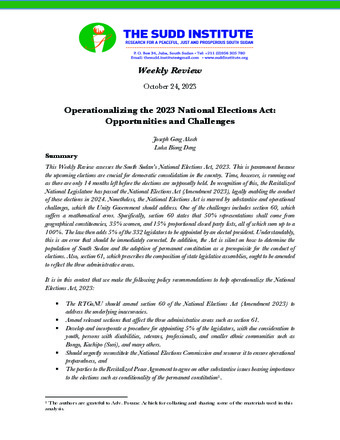
Operationalizing the 2023 National Elections Act: Opportunities and Challenges
Authors: Joseph Geng Akech, Luka Biong Deng Kuol
Type: Weekly Reviews
Date: 24/10/2023
This Weekly Review assesses the South Sudan’s National Elections Act, 2023. This is paramount because the upcoming elections are crucial for democratic consolidation in the country. Time, however, is running out as there are only 14 months left before the elections are supposedly held.
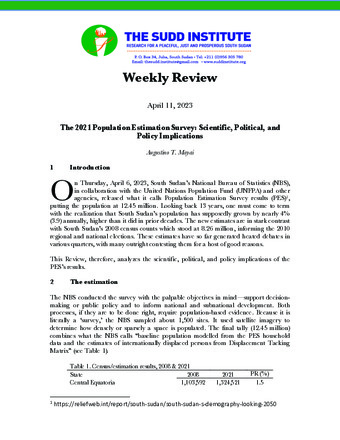
The 2021 Population Estimation Survey: Scientific, Political, and Policy Implications
Author: Augustino Ting Mayai
Organization: The Sudd Institute
Type: Weekly Reviews
Date: 11/04/2023
On Thursday, April 6, 2023, South Sudan’s National Bureau of Statistics (NBS), in collaboration with the United Nations Population Fund (UNFPA) and other agencies, released what it calls Population Estimation Survey results (PES), putting the population at 12.45 million.
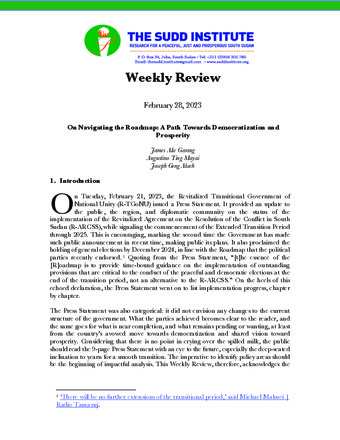
On Navigating the Roadmap: A Path Towards Democratization and Prosperity
Authors: Joseph Geng Akech, James Alic Garang, Augustino Ting Mayai
Type: Weekly Reviews
Date: 28/02/2023
On Tuesday, February 21, 2023, the Revitalized Transitional Government of National Unity (R-TGoNU) issued a Press Statement. It provided an update to the public, the region, and diplomatic community on the status of the implementation of the Revitalized Agreement on the Resolution of the Conflict in South Sudan (R-ARCSS), while...
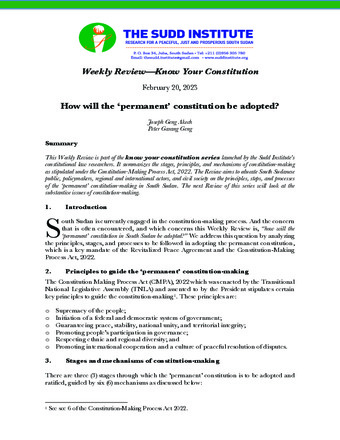
How will the ‘permanent’ constitution be adopted?
Authors: Joseph Geng Akech, Peter Garang Geng
Type: Weekly Reviews
Date: 20/02/2023
This Weekly Review is part of the know your constitution series launched by the Sudd Institute’s constitutional law researchers. It summarizes the stages, principles, and mechanisms of constitution-making as stipulated under the Constitution-Making Process Act, 2022.
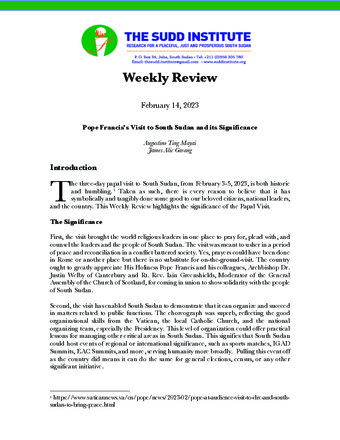
Pope Francis’s Visit to South Sudan and its Significance
Authors: James Alic Garang, Augustino Ting Mayai
Type: Weekly Reviews
Date: 14/02/2023
The three-day papal visit to South Sudan, from February 3-5, 2023, is both historic and humbling. Taken as such, there is every reason to believe that it has symbolically and tangibly done some good to our beloved citizens, national leaders, and the country.
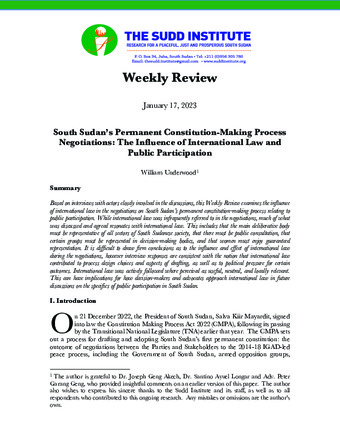
South Sudan’s Permanent Constitution-Making Process Negotiations: The Influence of International Law and Public Participation
Author: William Underwood
Type: Weekly Reviews
Date: 17/01/2023
Based on interviews with actors closely involved in the discussions, this Weekly Review examines the influence of international law in the negotiations on South Sudan’s permanent constitution-making process relating to public participation. While international law was infrequently referred to in the negotiations, much of what was discussed and agreed resonates...
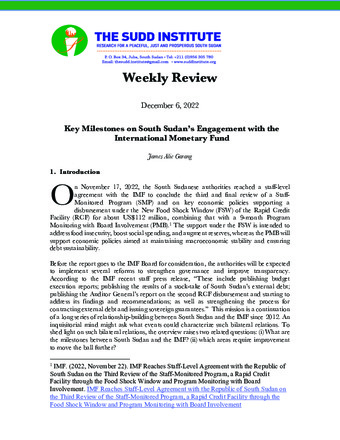
Key Milestones on South Sudan’s Engagement with the International Monetary Fund
Author: James Alic Garang
Type: Weekly Reviews
Date: 06/12/2022
On November 17, 2022, the South Sudanese authorities reached a staff-level agreement with the IMF to conclude the third and final review of a Staff-Monitored Program (SMP) and on key economic policies supporting a disbursement under the New Food Shock Window (FSW) of the Rapid Credit Facility (RCF) for about...
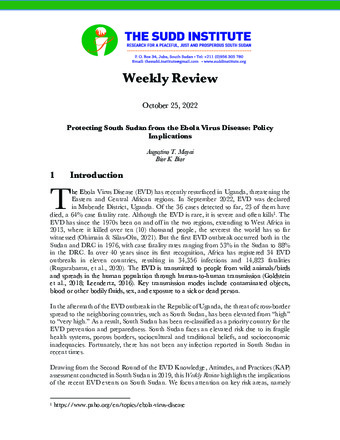
Protecting South Sudan from the Ebola Virus Disease: Policy Implications
Authors: Bior K. Bior, Augustino Ting Mayai
Type: Weekly Reviews
Date: 25/10/2022
In the aftermath of the EVD outbreak in the Republic of Uganda, the threat of cross-border spread to the neighboring countries, such as South Sudan, has been elevated from “high” to “very high.” As a result, South Sudan has been re-classified as a priority country for the EVD prevention and preparedness.
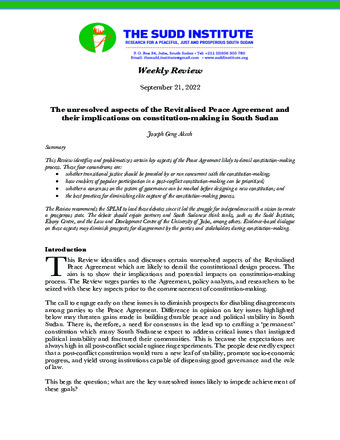
The unresolved aspects of the Revitalised Peace Agreement and their implications on constitution-making in South Sudan
Author: Joseph Geng Akech
Type: Weekly Reviews
Date: 21/09/2022
This Review identifies and problematizes certain key aspects of the Peace Agreement likely to derail constitution-making process. These four conundrums are:
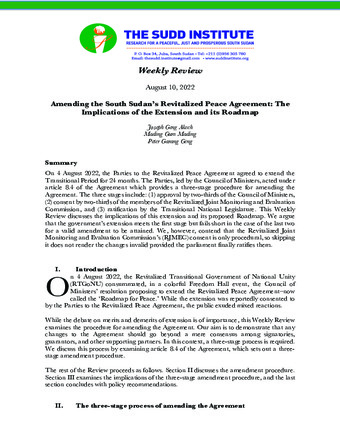
Amending the South Sudan’s Revitalized Peace Agreement: The Implications of the Extension and its Roadmap
Authors: Mading Gum Mading, Joseph Geng Akech, Peter Garang Geng
Type: Weekly Reviews
Date: 10/08/2022
On 4 August 2022, the Parties to the Revitalized Peace Agreement agreed to extend the Transitional Period for 24 months. The Parties, led by the Council of Ministers, acted under article 8.4 of the Agreement which provides a three-stage procedure for amending the Agreement.
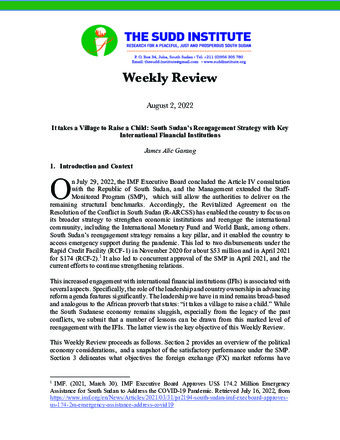
It takes a Village to Raise a Child: South Sudan’s Reengagement Strategy with Key International Financial Institutions
Author: James Alic Garang
Type: Weekly Reviews
Date: 02/08/2022
On July 29, 2022, the IMF Executive Board concluded the Article IV consultation with the Republic of South Sudan, and the Management extended the Staff-Monitored Program (SMP), which will allow the authorities to deliver on the remaining structural benchmarks.
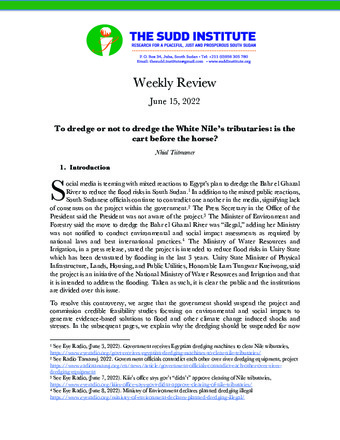
To dredge or not to dredge the White Nile’s tributaries: is the cart before the horse?
Author: Nhial Tiitmamer
Type: Weekly Reviews
Date: 15/06/2022
Social media is teeming with mixed reactions to Egypt’s plan to dredge the Bahr el Ghazal River to reduce the flood risks in South Sudan. In addition to the mixed public reactions, South Sudanese officials continue to contradict one another in the media, signifying lack of consensus on the project...
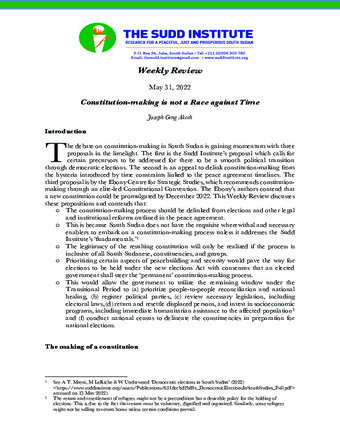
Constitution-making is not a Race against Time
Author: Joseph Geng Akech
Type: Weekly Reviews
Date: 31/05/2022
The debate on constitution-making in South Sudan is gaining momentum with three proposals in the limelight. The first is the Sudd Institute’s proposal which calls for certain precursors to be addressed for there to be a smooth political transition through democratic elections.
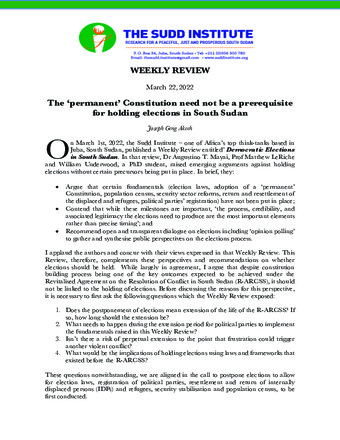
The ‘permanent’ Constitution need not be a prerequisite for holding elections in South Sudan
Author: Joseph Geng Akech
Type: Weekly Reviews
Date: 22/03/2022
On March 1st, 2022, the Sudd Institute – one of Africa’s top think-tanks based in Juba, South Sudan, published a Weekly Review entitled’ Democratic Elections in South Sudan. In that review, Dr Augustino T. Mayai, Prof Matthew LeRiche and William Underwood, a PhD student, raised emerging arguments against holding elections...
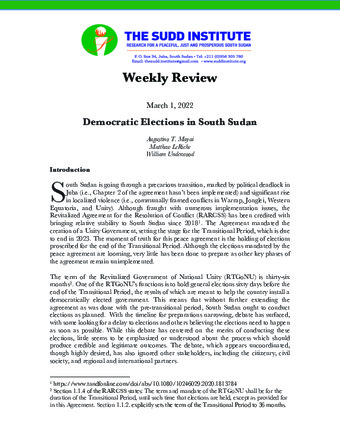
Democratic Elections in South Sudan
Authors: Matthew LeRiche, William Underwood, Augustino Ting Mayai
Type: Weekly Reviews
Date: 01/03/2022
This week’s Review analyzes South Sudan’s readiness to conduct elections in under a year and reflects on why they are important. We start out with the discussion of the election’s fundamentals, then move to why elections are imperative in a post-conflict context.
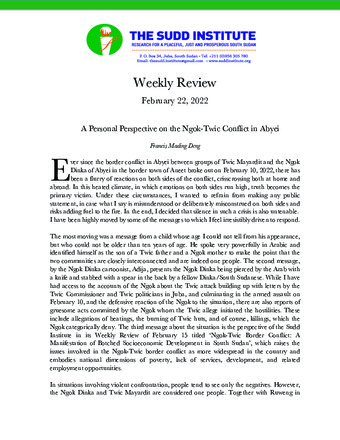
A Personal Perspective on the Ngok-Twic Conflict in Aneet
Author: Francis Mading Deng
Type: Weekly Reviews
Date: 22/02/2022
Ever since the conflict between groups of Twic Mayardit and the Ngok Dinka of Abyei in the border town of Aneet broke out on February 10, 2022, there has been a flurry of reactions on both sides of the conflict, crisscrossing both at home and abroad.
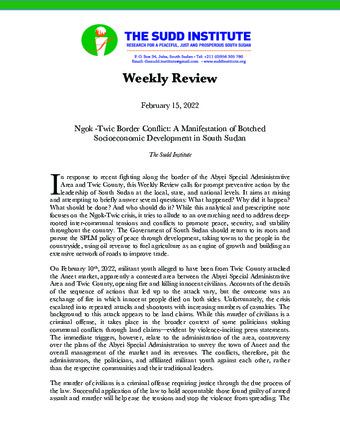
Ngok -Twic Border Conflict: A Manifestation of Botched Socioeconomic Development in South Sudan
Organization: The Sudd Institute
Type: Weekly Reviews
Date: 15/02/2022
In response to recent fighting along the border of the Abyei Special Administrative Area and Twic County, this Weekly Review calls for prompt preventive action by the leadership of South Sudan at the local, state, and national levels.
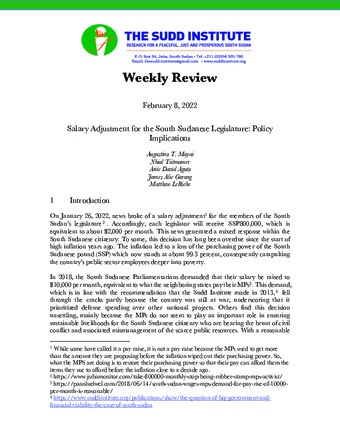
Salary Adjustment for the South Sudanese Legislature: Policy Implications
Authors: Matthew LeRiche, James Alic Garang, Ariic David Aguto Reng, Nhial Tiitmamer, Augustino Ting Mayai
Type: Weekly Reviews
Date: 08/02/2022
This Weekly Review analyzes this new policy by looking at factors that necessitated it, budgetary implications, and more broadly, policy implications for the public sector employees, as well as macroeconomic stability. We conclude the Review with policy recommendations that are targeted at the imperative of conducting public sector wage review...
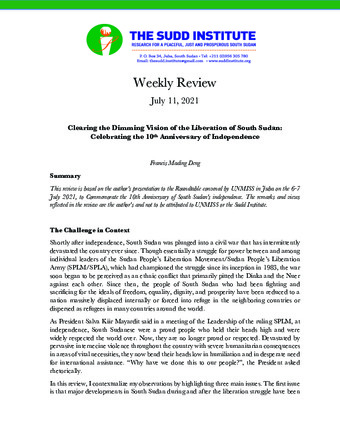
Clearing the Dimming Vision of the Liberation of South Sudan: Celebrating the 10th Anniversary of Independence
Author: Francis Mading Deng
Type: Weekly Reviews
Date: 11/07/2021
This review is based on the author's presentation to the Roundtable convened by UNMISS in Juba on the 6-7 July 2021, to Commemorate the 10th Anniversary of South Sudan's independence. The remarks and views reflected in the review are the author's and not to be attributed to UNMISS or the...
Will the Impact of the Pandemic on the Expected National Output Persist?
Author: James Alic Garang
Type: Weekly Reviews
Date: 03/06/2021
This weekly review contributes to the debate on how the COVID-19 induced hysteresis effects could affect growth in South Sudan. It addresses two related questions: What channels would transmit the COVID-19 scarring effects to the output? What can public policy do to support recovery?
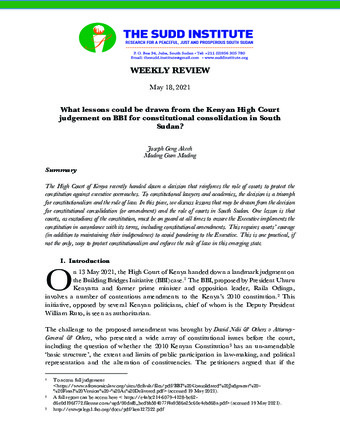
What lessons could be drawn from the Kenyan High Court judgement on BBI for constitutional consolidation in South Sudan?
Authors: Mading Gum Mading, Joseph Geng Akech
Type: Weekly Reviews
Date: 18/05/2021
The High Court of Kenya recently handed down a decision that reinforces the role of courts to protect the constitution against executive overreaches. To constitutional lawyers and academics, the decision is a triumph for constitutionalism and the rule of law.
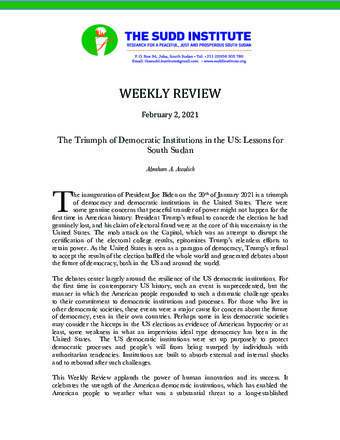
The Triumph of Democratic Institutions in the US: Lessons for South Sudan
Author: Abraham Awolich
Type: Weekly Reviews
Date: 02/02/2021
This Weekly Review applauds the power of human innovation and its success. It celebrates the strength of the American democratic institutions, which has enabled the American people to weather what was a substantial threat to a long-established institutional tradition of peaceful transfer of power.
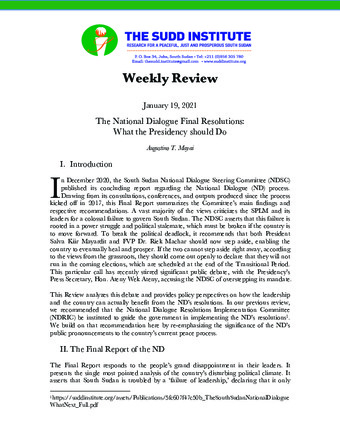
The National Dialogue Final Resolutions: What the Presidency should Do
Author: Augustino Ting Mayai
Type: Weekly Reviews
Date: 19/01/2021
In December 2020, the South Sudan National Dialogue Steering Committee (NDSC) published its concluding report regarding the National Dialogue (ND) process. Drawing from its consultations, conferences, and outputs produced since the process kicked off in 2017, this Final Report summarizes the Committee’s main findings and respective recommendations.
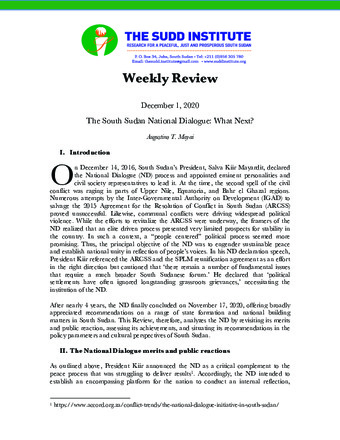
The South Sudan National Dialogue: What Next?
Author: Augustino Ting Mayai
Type: Weekly Reviews
Date: 01/12/2020
After nearly 4 years, the ND finally concluded on November 17, 2020, offering broadly appreciated recommendations on a range of state formation and national building matters in South Sudan. This Review, therefore, analyzes the ND by revisiting its merits and public reaction, assessing its achievements, and situating its recommendations in...
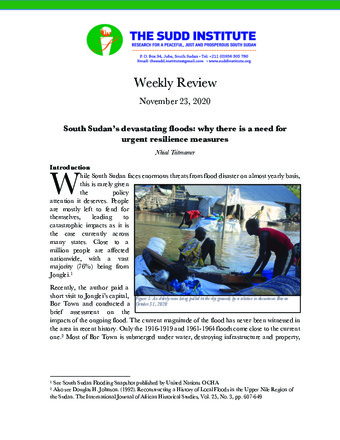
South Sudan’s devastating floods: why there is a need for urgent resilience measures
Author: Nhial Tiitmamer
Type: Weekly Reviews
Date: 23/11/2020
This review explores the magnitude of this year’s flood and its impacts in Bor Town. We used a boat to get us around the town surveying the extent of flood water and measuring its depth in the streets and in the residential neighborhoods.
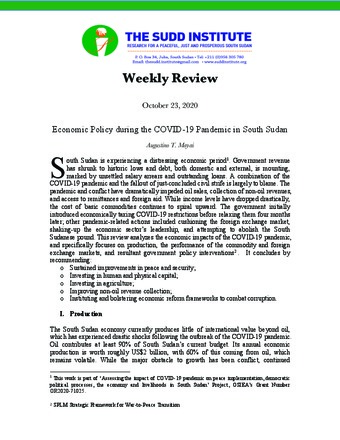
Economic Policy during the COVID-19 Pandemic in South Sudan
Author: Augustino Ting Mayai
Type: Weekly Reviews
Date: 23/10/2020
South Sudan is experiencing a distressing economic period. Government revenue has shrunk to historic lows and debt, both domestic and external, is mounting, marked by unsettled salary arrears and outstanding loans. A combination of the COVID-19 pandemic and the fallout of just-concluded civil strife is largely to blame.
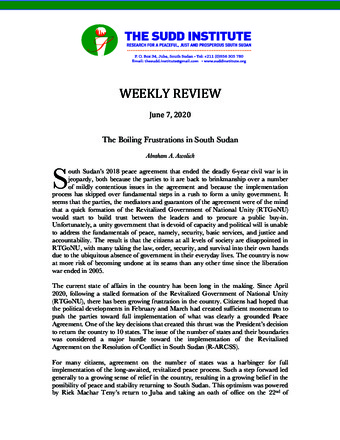
The Boiling Frustrations in South Sudan
Author: Abraham Awolich
Type: Weekly Reviews
Date: 07/06/2020
The current state of affairs in the country has been long in the making. Since April 2020, following a stalled formation of the Revitalized Government of National Unity (RTGoNU), there has been growing frustration in the country.
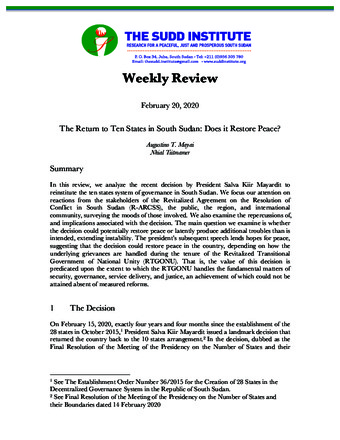
The Return to Ten States in South Sudan: Does it Restore Peace?
Authors: Nhial Tiitmamer, Augustino Ting Mayai
Organization: The Sudd Institute
Type: Weekly Reviews
Date: 21/02/2020
In this review, we analyze the recent decision by President Salva Kiir Mayardit to reinstitute the ten states system of governance in South Sudan. We focus our attention on reactions from the stakeholders of the Revitalized Agreement on the Resolution of Conflict in South Sudan (R-ARCSS), the public, the region,...
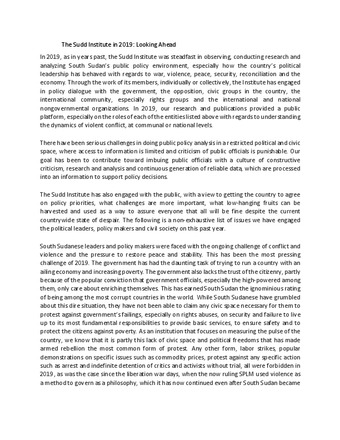
The Sudd Institute in 2019: Looking Ahead
Author: Jok Madut Jok
Organization: The Sudd Institute
Type: Weekly Reviews
Date: 20/01/2020
In 2019, as in years past, the Sudd Institute was steadfast in observing, conducting research and analyzing South Sudan’s public policy environment, especially how the country’s political leadership has behaved with regards to war, violence, peace, security, reconciliation and the economy.
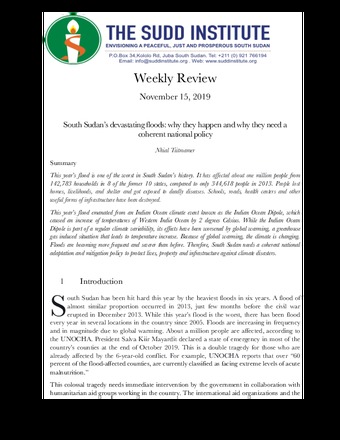
South Sudan's devastating floods: why they happen and why they need a coherent national policy
Author: Nhial Tiitmamer
Organization: The Sudd Institute
Type: Weekly Reviews
Date: 11/12/2019
This year’s flood is one of the worst in South Sudan’s history. It has affected about one million people from 142,783 households in 8 of the former 10 states, compared to only 344,618 people in 2013. People lost homes, livelihoods, and shelter and got exposed to deadly diseases.
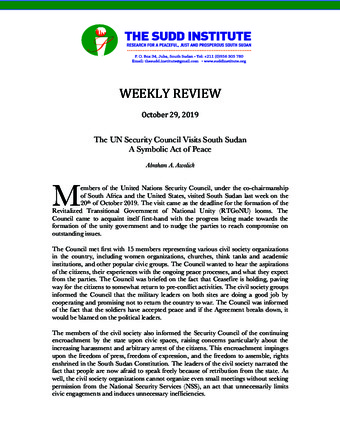
The UN Security Council Visits South Sudan: A Symbolic Act of Peace
Author: Abraham Awolich
Type: Weekly Reviews
Date: 29/10/2019
Members of the United Nations Security Council, under the co-chairmanship of South Africa and the United States, visited South Sudan last week on the 20thof October 2019. The visit came as the deadline for the formation of the Revitalized Transitional Government of National Unity (RTGoNU) looms. The Council came to...
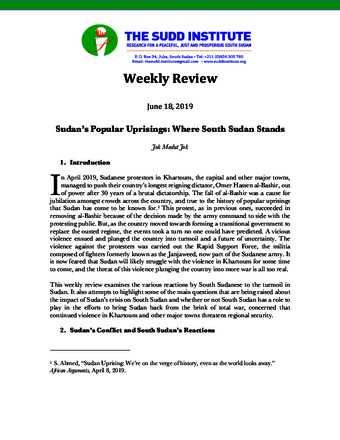
Sudan’s Popular Uprisings: Where South Sudan Stands
Author: Jok Madut Jok
Type: Weekly Reviews
Date: 18/06/2019
In April 2019, Sudanese protestors in Khartoum, the capital and other major towns, managed to push their country’s longest reigning dictator, Omer Hassen al-Bashir, out of power after 30 years of a brutal dictatorship. The fall of al-Bashir was a cause for jubilation amongst crowds across the country, and true...
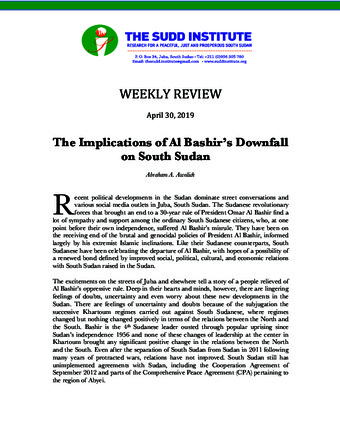
The Implications of Al Bashir’s Downfall on South Sudan
Author: Abraham Awolich
Organization: The Sudd Institute
Type: Weekly Reviews
Date: 30/04/2019
Recent political developments in the Sudan dominate street conversations and various social media outlets in Juba, South Sudan. The Sudanese revolutionary forces that brought an end to a 30-year rule of President Omar Al Bashir find a lot of sympathy and support among the ordinary South Sudanese citizens, who, at...
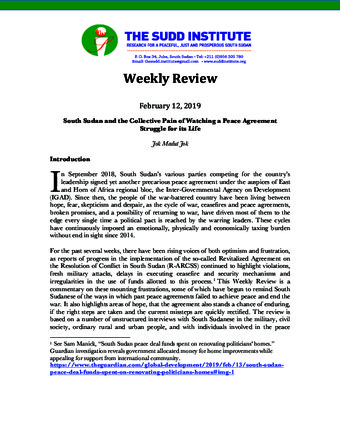
South Sudan and the Collective Pain of Watching a Peace Agreement Struggle for its Life
Author: Jok Madut Jok
Type: Weekly Reviews
Date: 12/02/2019
For the past several weeks, there have been rising voices of both optimism and frustration, as reports of progress in the implementation of the so-called Revitalized Agreement on the Resolution of Conflict in South Sudan (R-ARCSS) continued to highlight violations, fresh military attacks, delays in executing ceasefire and security mechanisms...
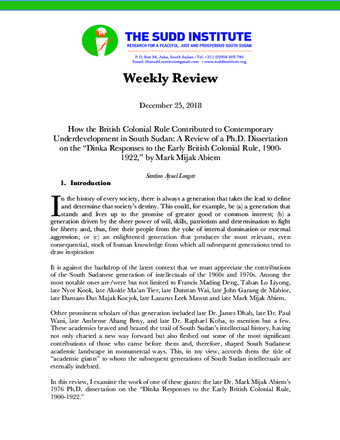
How the British Colonial Rule Contributed to Contemporary Underdevelopment in South Sudan: A Review of a Ph.D. Dissertation on the “Dinka Responses to the Early British Colonial Rule, 1900-1922,” by Mark Mijak Abiem
Author: Santino Ayuel Longar
Type: Weekly Reviews
Date: 25/12/2018
In the history of every society, there is always a generation that takes the lead to define and determine that society’s destiny. This could, for example, be (a) a generation that stands and lives up to the promise of greater good or common interest; (b) a generation driven by the...
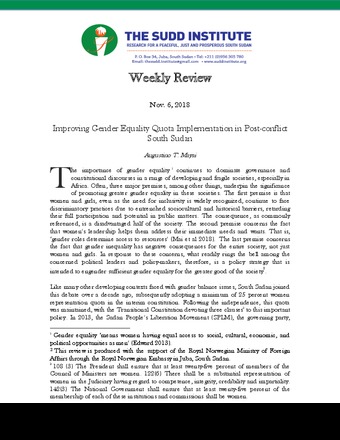
Improving Gender Equality Quota Implementation in Post-conflict South Sudan
Author: Augustino Ting Mayai
Type: Weekly Reviews
Date: 06/11/2018
In 2005, South Sudan adopted a minimum of 25 percent women representation quota in its interim constitution. Following the independence, this quota was maintained, with the Transitional Constitution devoting three clauses to this important policy. In 2013, the Sudan People’s Liberation Movement (SPLM), the governing party, proposed raising this quota...
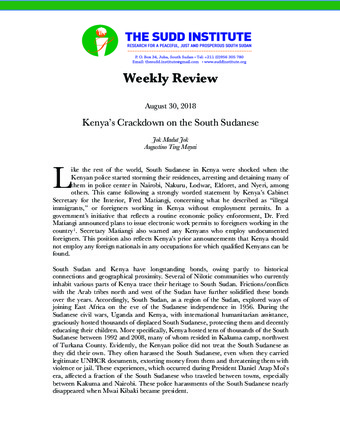
Kenya’s Crackdown on the South Sudanese
Authors: Jok Madut Jok, Augustino Ting Mayai
Type: Weekly Reviews
Date: 30/08/2018
Like the rest of the world, South Sudanese in Kenya were shocked when the Kenyan police started storming their residences, arresting and detaining many of them in police center in Nairobi, Nakuru, Lodwar, Eldoret, and Nyeri, among others.
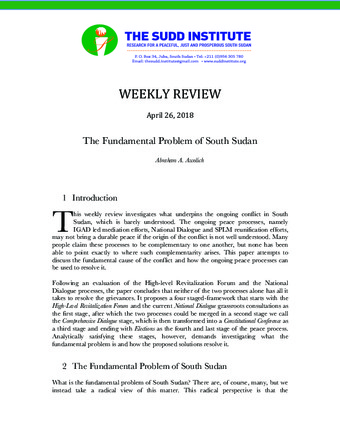
The Fundamental Problem of South Sudan
Author: Abraham Awolich
Type: Weekly Reviews
Date: 26/04/2018
This weekly review investigates what underpins the ongoing conflict in South Sudan, which is barely understood. The ongoing peace processes, namely IGAD led mediation efforts, National Dialogue and SPLM reunification efforts, may not bring a durable peace if the origin of the conflict is not well understood.
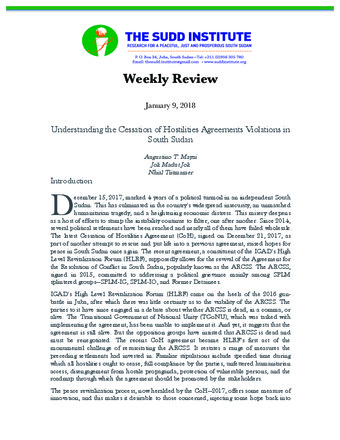
Understanding the Cessation of Hostilities Agreements Violations in South Sudan
Authors: Jok Madut Jok, Nhial Tiitmamer, Augustino Ting Mayai
Type: Weekly Reviews
Date: 09/01/2018
December 15, 2017, marked 4 years of a political turmoil in an independent South Sudan. This has culminated in the country’s widespread insecurity, an unmatched humanitarian tragedy, and a heightening economic distress. This misery deepens as a host of efforts to stamp the instability continues to falter, one after another.
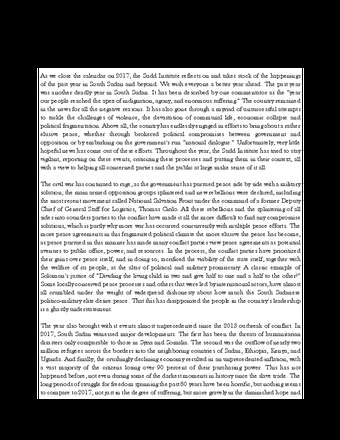
The Sudd Institute in 2017
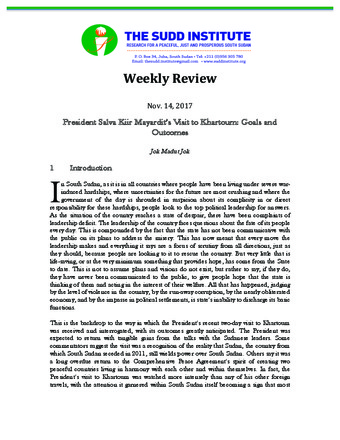
President Salva Kiir Mayardit’s Visit to Khartoum: Goals and Outcomes
Author: Jok Madut Jok
Type: Weekly Reviews
Date: 14/11/2017
People who study the relationship between north and south of the old Sudan do recognize that the memories of the Sudanese state violence, racial and religious bigotry of many northern Sudanese leaders and the anti-north sentiments they have engendered in the south, all of which fueled the drive for the...
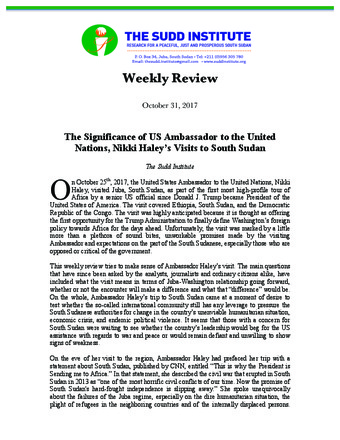
The Significance of US Ambassador to the United Nations, Nikki Haley’s Visits to South Sudan
Author: The Sudd Institute
Organization: The Sudd Institute
Type: Weekly Reviews
Date: 31/10/2017
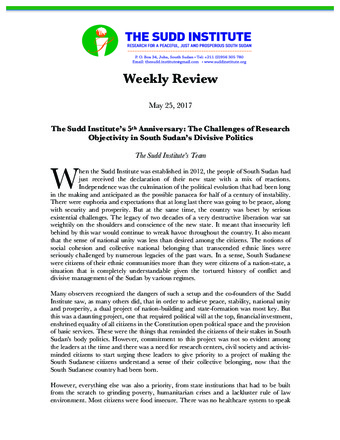
The Sudd Institute’s 5th Anniversary: The Challenges of Research Objectivity in South Sudan’s Divisive Politics
Author: The Sudd Institute
Type: Weekly Reviews
Date: 25/05/2017
When the Sudd Institute was established in 2012, the people of South Sudan had just received the declaration of their new state with a mix of reactions. Independence was the culmination of the political evolution that had been long in the making and anticipated as the possible panacea for half...
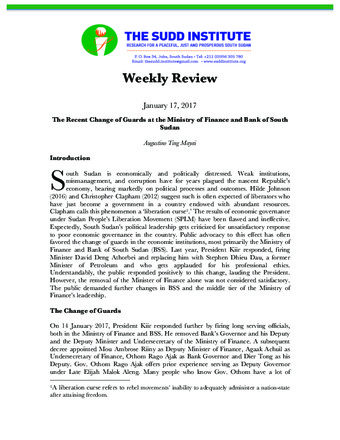
The Recent Change of Guards at the Ministry of Finance and Bank of South Sudan
Author: Augustino Ting Mayai
Type: Weekly Reviews
Date: 17/01/2017
South Sudan is economically and politically distressed. Weak institutions, mismanagement, and corruption have for years plagued the nascent Republic’s economy, bearing markedly on political processes and outcomes. Hilde Johnson (2016) and Christopher Clapham (2012) suggest such is often expected of liberators who have just become a government in a country...
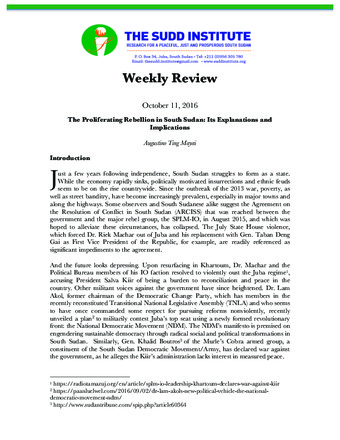
The Proliferating Rebellion in South Sudan: Its Explanations and Implications
Author: Augustino Ting Mayai
Type: Weekly Reviews
Date: 11/10/2016
For nearly a decade now, several armed groups have emerged all over the country, with some of them sometimes signing agreements with the government that last only a very short time. What normally follows, as historically evident, is a cycle of rebellions and sojourning political settlements, with rebel leaders shuttling...
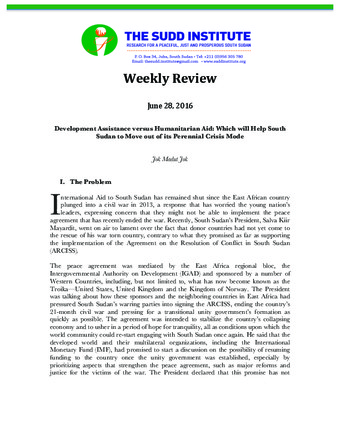
Development Assistance versus Humanitarian Aid: Which will Help South Sudan to Move out of its Perennial Crisis Mode
Author: Jok Madut Jok
Organization: The Sudd Institute
Type: Weekly Reviews
Date: 28/06/2016
Seven weeks since the Transitional government of National Unity was formed, however, international development assistance to South Sudan remains shut. The countries that sponsored South Sudan’s peace process have suggested that they have not really cut aid to South Sudan, but have simply channeled it toward humanitarian programs and away...
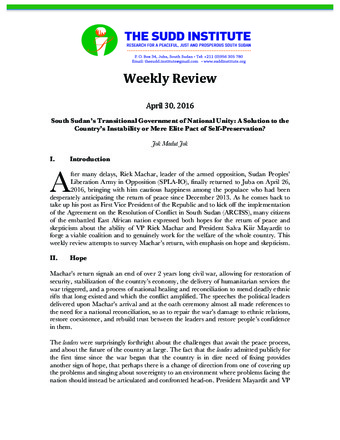
South Sudan’s Transitional Government of National Unity: A Solution to the Country’s Instability or Mere Elite Pact of Self-Preservation?
Author: Jok Madut Jok
Organization: The Sudd Institute
Type: Weekly Reviews
Date: 30/04/2016
After many delays, Riek Machar, leader of the armed opposition, Sudan Peoples’ Liberation Army in Opposition (SPLA-IO), finally returned to Juba on April 26, 2016, bringing with him cautious happiness among the populace who had been desperately anticipating the return of peace since December 2013.
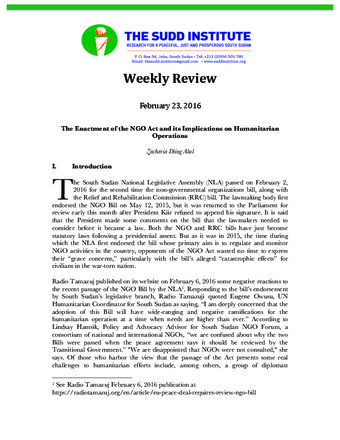
South Sudan’s Enactment of NGO Act and its Implications on Humanitarian Operations
Organization: The Sudd Institute
Type: Weekly Reviews
Date: 23/02/2016
The South Sudan National Legislative Assembly (NLA) passed on February 2, 2016 for the second time the non-governmental organizations bill, along with the Relief and Rehabilitation Commission (RRC) bill. The lawmaking body first endorsed the NGO Bill on May 12, 2015, but it was returned to the Parliament for review...
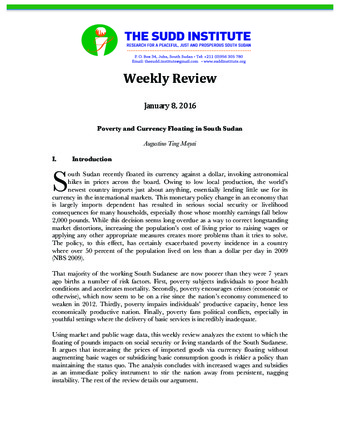
Poverty and Currency Floating in South Sudan
Author: Augustino Ting Mayai
Organization: The Sudd Institute
Type: Weekly Reviews
Date: 08/01/2016
South Sudan recently floated its currency against a dollar, invoking astronomical hikes in prices across the board. Owing to low local production, the world’s newest country imports just about anything, essentially lending little use for its currency in the international markets.
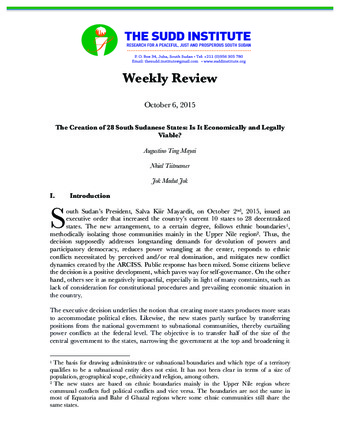
The Creation of 28 South Sudanese States: Is It Economically and Legally Viable?
Authors: Jok Madut Jok, Nhial Tiitmamer, Augustino Ting Mayai
Organization: The Sudd Institute
Type: Weekly Reviews
Date: 06/10/2015
South Sudan’s President, Salva Kiir Mayardit, on October 2nd, 2015, issued an executive order that increased the country’s current 10 states to 28 decentralized states. The new arrangement, to a certain degree, follows ethnic boundaries[1], methodically isolating those communities mainly in the Upper Nile region[2].
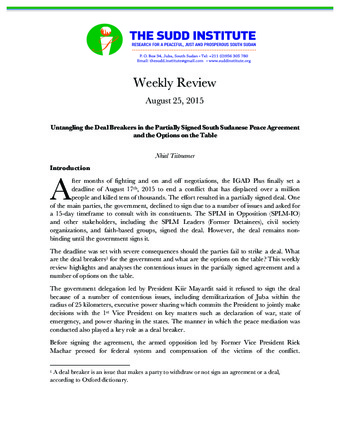
Untangling the Deal Breakers in the Partially Signed South Sudanese Peace Agreement and the Options on the Table
Author: Nhial Tiitmamer
Organization: The Sudd Institute
Type: Weekly Reviews
Date: 25/08/2015
After months of fighting and on and off negotiations, the IGAD Plus finally set a deadline of August 17th, 2015 to end a conflict that has displaced over a million people and killed tens of thousands. The effort resulted in a partially signed deal.
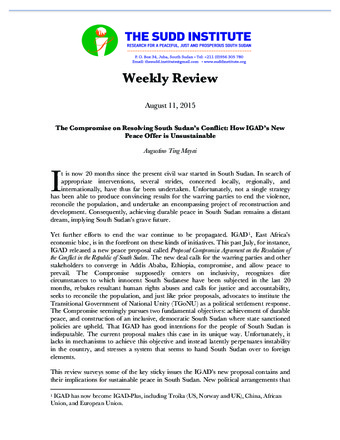
The Compromise on Resolving South Sudan’s Conflict: How IGAD’s New Peace Offer is Unsustainable
Author: Augustino Ting Mayai
Organization: The Sudd Institute
Type: Weekly Reviews
Date: 11/08/2015
It is now 20 months since the present civil war started in South Sudan. In search of appropriate interventions, several strides, concerted locally, regionally, and internationally, have thus far been undertaken. Unfortunately, not a single strategy has been able to produce convincing results for the warring parties to end the...
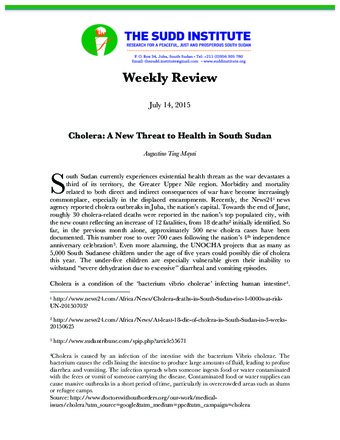
Cholera: A New Threat to Health in South Sudan
Author: Augustino Ting Mayai
Organization: The Sudd Institute
Type: Weekly Reviews
Date: 14/07/2015
South Sudan currently experiences existential health threats as the war devastates a third of its territory, the Greater Upper Nile region. Morbidity and mortality related to both direct and indirect consequences of war have become increasingly commonplace, especially in the displaced encampments.
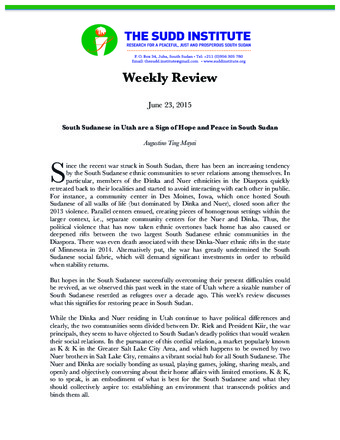
South Sudanese in Utah are a Sign of Hope and Peace in South Sudan
Author: Augustino Ting Mayai
Organization: The Sudd Institute
Type: Weekly Reviews
Date: 23/06/2015
Since the recent war struck in South Sudan, there has been an increasing tendency by the South Sudanese ethnic communities to sever relations among themselves. In particular, members of the Dinka and Nuer ethnicities in the Diaspora quickly retreated back to their localities and started to avoid interacting with each...
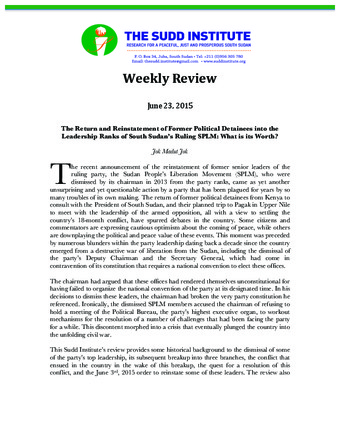
The Return and Reinstatement of Former Political Detainees into the Leadership Ranks of South Sudan’s Ruling SPLM: What is its Worth?
Author: Jok Madut Jok
Organization: The Sudd Institute
Type: Weekly Reviews
Date: 23/06/2015
The recent announcement of the reinstatement of former senior leaders of the ruling party, the Sudan People’s Liberation Movement (SPLM), who were dismissed by its chairman in 2013 from the party ranks, came as yet another unsurprising and yet questionable action by a party that has been plagued for years...
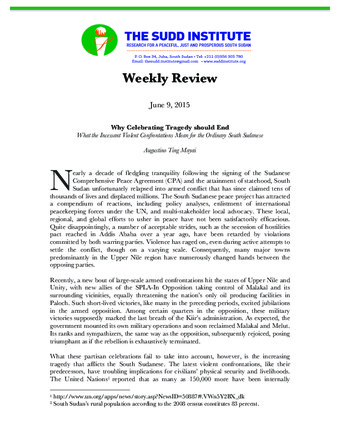
Why Celebrating Tragedy should End: What the Incessant Violent Confrontations Mean for the Ordinary South Sudanese
Author: Augustino Ting Mayai
Organization: The Sudd Institute
Type: Weekly Reviews
Date: 09/06/2015
Recently, a new bout of large-scale armed confrontations hit the states of Upper Nile and Unity, with new allies of the SPLA-In Opposition taking control of Malakal and its surrounding vicinities, equally threatening the nation’s only oil producing facilities in Paloch.
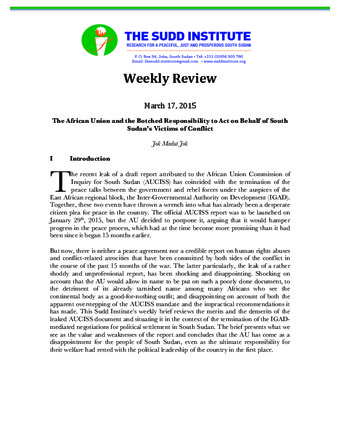
The African Union and the Botched Responsibility to Act on Behalf of South Sudan’s Victims of Conflict
Author: Jok Madut Jok
Organization: The Sudd Institute
Type: Weekly Reviews
Date: 17/03/2015
The recent leak of a draft report attributed to the African Union Commission of Inquiry for South Sudan (AUCISS) has coincided with the termination of the peace talks between the government and rebel forces under the auspices of the East African regional block, the Inter-Governmental Authority on Development (IGAD).
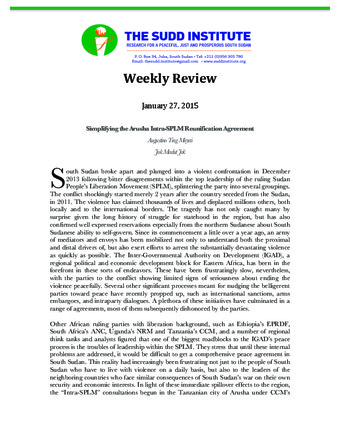
Simplifying the Arusha Intra-SPLM Reunification Agreement
Authors: Jok Madut Jok, Augustino Ting Mayai
Organization: The Sudd Institute
Type: Weekly Reviews
Date: 27/01/2015
South Sudan broke apart and plunged into a violent confrontation in December 2013 following bitter disagreements within the top leadership of the ruling Sudan People’s Liberation Movement (SPLM), splintering the party into several groupings. The conflict shockingly started merely 2 years after the country seceded from the Sudan, in 2011.
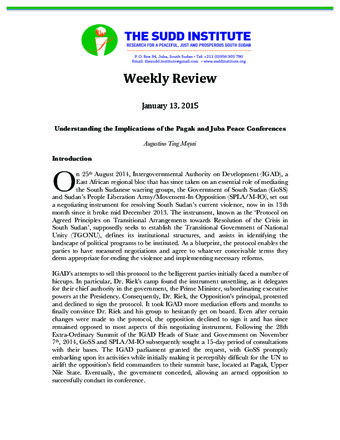
Understanding the Implications of the Pagak and Juba Peace Conferences
Author: Augustino Ting Mayai
Organization: The Sudd Institute
Type: Weekly Reviews
Date: 13/01/2015
On 25th August 2014, Intergovernmental Authority on Development (IGAD), a East African regional bloc that has since taken on an essential role of mediating the South Sudanese warring groups, the Government of South Sudan (GoSS) and Sudan’s People Liberation Army/Movement-In Opposition (SPLA/M-IO), set out a negotiating instrument for resolving South...
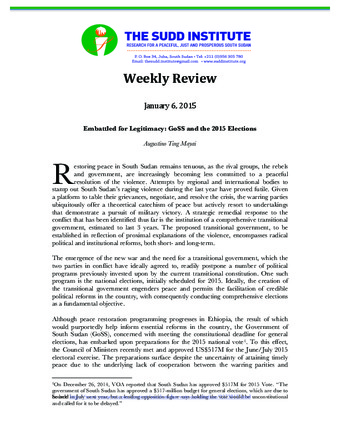
Embattled for Legitimacy: GoSS and the 2015 Elections
Author: Augustino Ting Mayai
Organization: The Sudd Institute
Type: Weekly Reviews
Date: 06/01/2015
Restoring peace in South Sudan remains tenuous, as the rival groups, the rebels and government, are increasingly becoming less committed to a peaceful resolution of the violence. Attempts by regional and international bodies to stamp out South Sudan’s raging violence during the last year have proved futile.
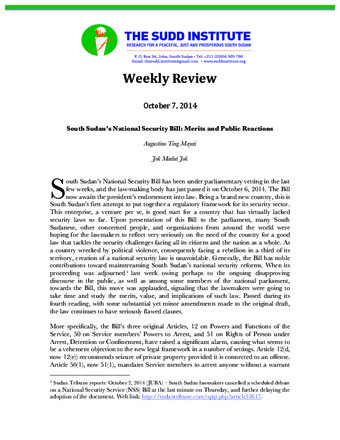
South Sudan’s National Security Bill: Merits and Public Reactions
Authors: Jok Madut Jok, Augustino Ting Mayai
Organization: The Sudd Institute
Type: Weekly Reviews
Date: 07/10/2014
South Sudan’s National Security Bill has been under parliamentary vetting in the last few weeks, and the law-making body has just passed it on October 6, 2014. The Bill now awaits the president’s endorsement into law.
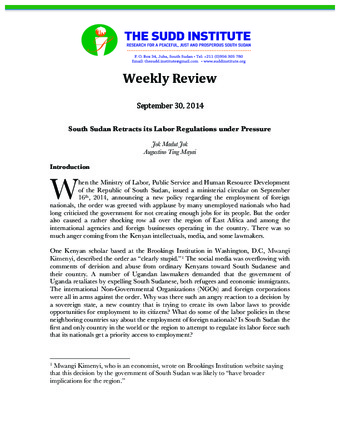
South Sudan Retracts its Labor Regulations under Pressure
Authors: Jok Madut Jok, Augustino Ting Mayai
Organization: The Sudd Institute
Type: Weekly Reviews
Date: 30/09/2014
When the Ministry of Labor, Public Service and Human Resource Development of the Republic of South Sudan, issued a ministerial circular on September 16th, 2014, announcing a new policy regarding the employment of foreign nationals, the order was greeted with applause by many unemployed nationals who had long criticized the...
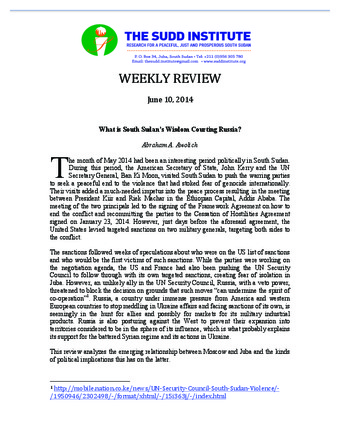
What is South Sudan’s Wisdom Courting Russia?
Author: Abraham Awolich
Organization: The Sudd Institute
Type: Weekly Reviews
Date: 10/06/2014
The month of May 2014 had been an interesting period politically in South Sudan. During this period, the American Secretary of State, John Kerry and the UN Secretary General, Ban Ki Moon, visited South Sudan to push the warring parties to seek a peaceful end to the violence that had...
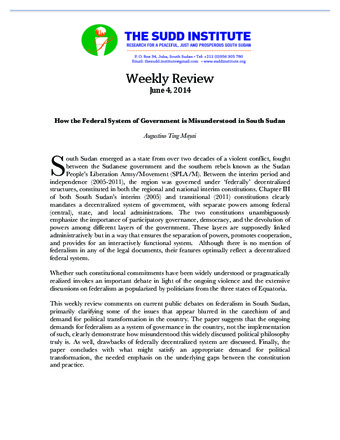
How the Federal System of Government is Misunderstood in South Sudan
Author: Augustino Ting Mayai
Organization: The Sudd Institute
Type: Weekly Reviews
Date: 03/06/2014
South Sudan emerged as a state from over two decades of a violent conflict, fought between the Sudanese government and the southern rebels known as the Sudan People’s Liberation Army/Movement (SPLA/M). Between the interim period and independence (2005-2011), the region was governed under ‘federally’ decentralized structures, constituted in both the...
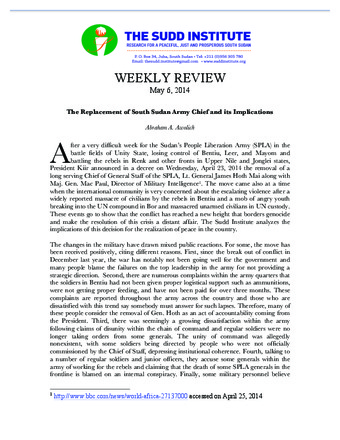
The Replacement of South Sudan Army Chief and its Implications
Author: Abraham Awolich
Organization: The Sudd Institute
Type: Weekly Reviews
Date: 06/05/2014
After a very difficult week for the Sudan’s People Liberation Army (SPLA) in the battle fields of Unity State, losing control of Bentiu, Leer, and Mayom and battling the rebels in Renk and other fronts in Upper Nile and Jonglei states, President Kiir announced in a decree on Wednesday, April...
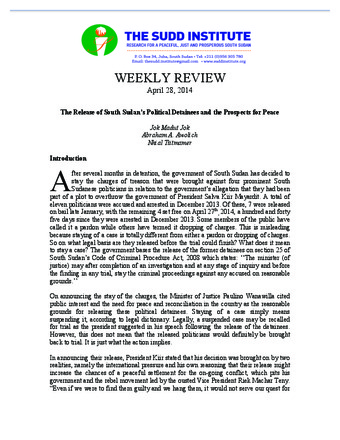
The Release of South Sudan’s Political Detainees and the Prospects for Peace
Authors: Abraham Awolich, Jok Madut Jok, Nhial Tiitmamer
Organization: The Sudd Institute
Type: Weekly Reviews
Date: 28/04/2014
After several months in detention, the government of South Sudan has decided to stay the charges of treason that were brought against four prominent South Sudanese politicians in relation to the government’s allegation that they had been part of a plot to overthrow the government of President Salva Kiir Mayardit.
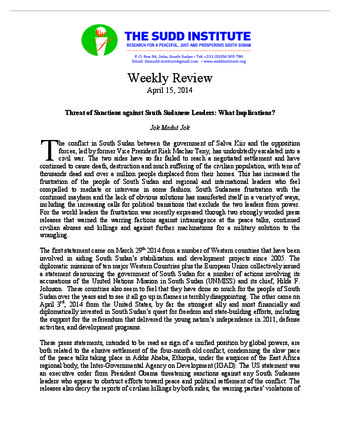
Threat of Sanctions against South Sudanese Leaders: What Implications?
Author: Jok Madut Jok
Organization: The Sudd Institute
Type: Weekly Reviews
Date: 15/04/2014
The conflict in South Sudan between the government of Salva Kiir and the opposition forces, led by former Vice President Riek Machar Teny, has undoubtedly escalated into a civil war. The two sides have so far failed to reach a negotiated settlement and have continued to cause death, destruction and...
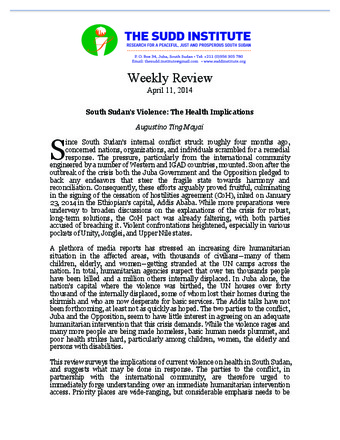
South Sudan’s Violence: The Health Implications
Author: Augustino Ting Mayai
Organization: The Sudd Institute
Type: Weekly Reviews
Date: 11/04/2014
Since South Sudan’s internal conflict struck roughly four months ago, concerned nations, organizations, and individuals scrambled for a remedial response. The pressure, particularly from the international community engineered by a number of Western and IGAD countries, mounted.
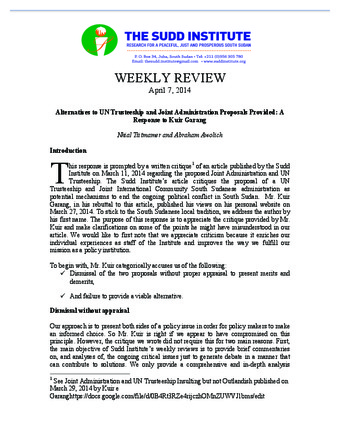
Alternatives to UN Trusteeship and Joint Administration Proposals Provided: A Response to Kuir Garang
Authors: Abraham Awolich, Nhial Tiitmamer
Organization: The Sudd Institute
Type: Weekly Reviews
Date: 07/04/2014
This response is prompted by a written critique of an article published by the Sudd Institute on March 11, 2014 regarding the proposed Joint Administration and UN Trusteeship. The Sudd Institute’s article critiques the proposal of a UN Trusteeship and Joint International Community South Sudanese administration as potential mechanisms to...
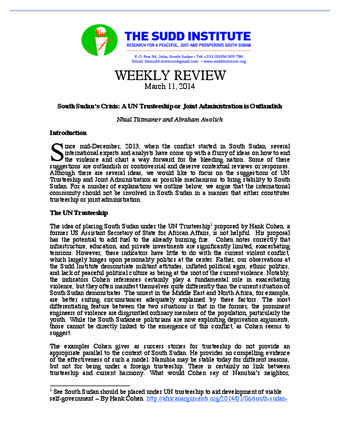
South Sudan’s Crisis: A UN Trusteeship or Joint Administration is Outlandish
Authors: Abraham Awolich, Nhial Tiitmamer
Organization: The Sudd Institute
Type: Weekly Reviews
Date: 11/03/2014
Since mid-December, 2013, when the conflict started in South Sudan, several international experts and analysts have come up with a flurry of ideas on how to end the violence and chart a way forward for the bleeding nation.
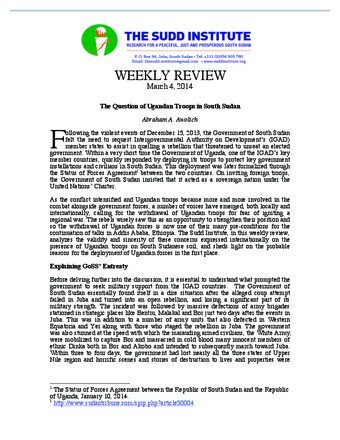
The Question of Ugandan Troops in South Sudan
Author: Abraham Awolich
Organization: The Sudd Institute
Type: Weekly Reviews
Date: 04/03/2014
Following the violent events of December 15, 2013, the Government of South Sudan felt the need to request Intergovernmental Authority on Development’s (IGAD) member states to assist in quelling a rebellion that threatened to unseat an elected government.
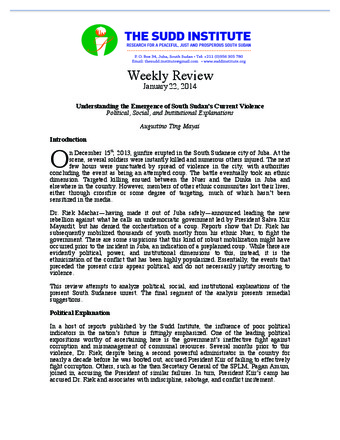
Understanding the Emergence of South Sudan’s Current Violence: Political, Social, and Institutional Explanations
Author: Augustino Ting Mayai
Organization: The Sudd Institute
Type: Weekly Reviews
Date: 22/01/2014
On December 15th, 2013, gunfire erupted in the South Sudanese city of Juba. At the scene, several soldiers were instantly killed and numerous others injured. The next few hours were punctuated by spread of violence in the city, with authorities concluding the event as being an attempted coup.
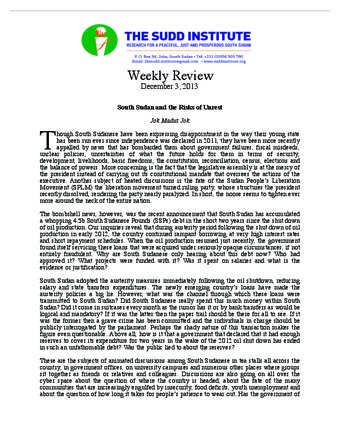
South Sudan and the Risks of Unrest
Author: Jok Madut Jok
Organization: The Sudd Institute
Type: Weekly Reviews
Date: 03/12/2013
Though South Sudanese have been expressing disappointment in the way their young state has been run ever since independence was declared in 2011, they have been more recently appalled by news that has bombarded them about government failures, fiscal misdeeds, unclear policies, uncertainties of what the future holds for them...
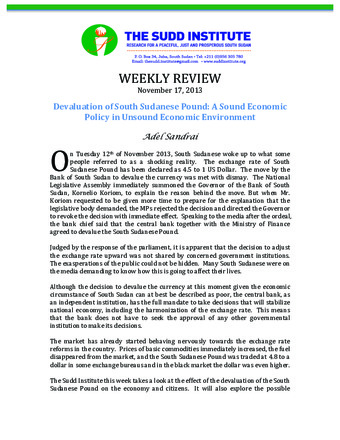
Devaluation of South Sudanese Pound: A Sound Economic Policy in Unsound Economic Environment
Author: Adel Sandrai
Organization: The Sudd Institute
Type: Weekly Reviews
Date: 17/11/2013
The move by the Bank of South Sudan to devaluate the South Sudanese Pound was met with stiff opposition from the cross-section of the public. The market reacted nervously to the decision. The National Legislative Assembly summoned the Governor of the Central Bank and demanded for an explanation.
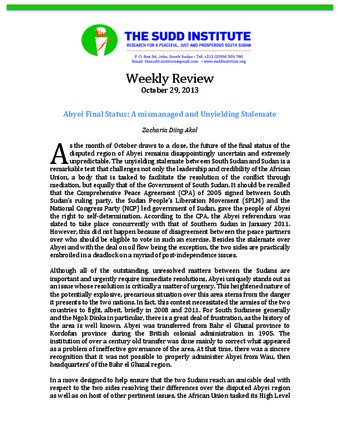
Abyei Final Status: A Mismanaged and Unyielding Stalemate
Organization: The Sudd Institute
Type: Weekly Reviews
Date: 29/10/2013
As the month of October draws to a close, the future of the final status of the disputed region of Abyei remains disappointingly uncertain and extremely unpredictable. The unyielding stalemate between South Sudan and Sudan is a remarkable test that challenges not only the leadership and credibility of the African...
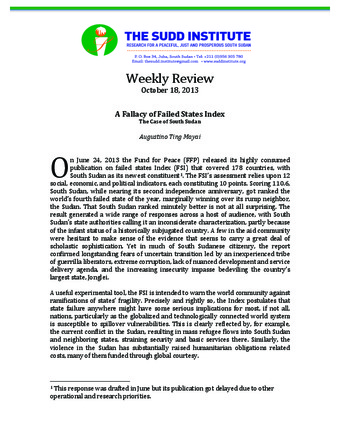
A Fallacy of Failed States Index: The Case of South Sudan
Author: Augustino Ting Mayai
Organization: The Sudd Institute
Type: Weekly Reviews
Date: 18/10/2013
A useful experimental tool, the FSI is intended to warn the world community against ramifications of states’ fragility. Precisely and rightly so, the Index postulates that state failure anywhere might have some serious implications for most, if not all, nations, particularly as the globalized and technologically connected world system is...
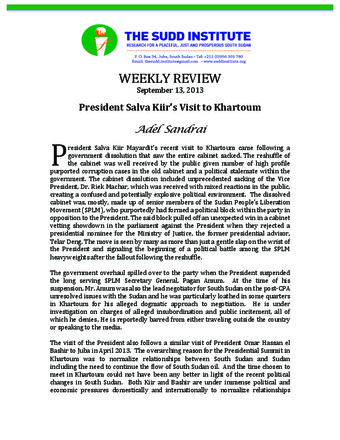
President Salva Kiir’s Visit to Khartoum
Author: Adel Sandrai
Organization: The Sudd Institute
Type: Weekly Reviews
Date: 13/09/2013
The Sudd Institute analyzes the net gain from the visit of President Salva Kiir Mayardit to Khartoum, the driving factors behind the move to hold the Presidential Summit and the potential political backlash resulting from changing national political landscapes in South Sudan.
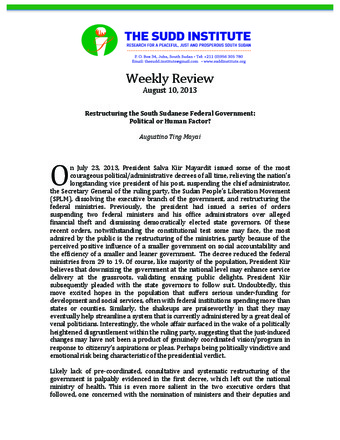
Restructuring the South Sudanese Federal Government: Political or Human Factor?
Author: Augustino Ting Mayai
Organization: The Sudd Institute
Type: Weekly Reviews
Date: 10/08/2013
On July 23, 2013, President Salva Kiir Mayardit issued some of the most courageous political/administrative decrees of all time, relieving the nation’s longstanding vice president of his post, suspending the chief administrator, the Secretary General of the ruling party, the Sudan People’s Liberation Movement (SPLM), dissolving the executive branch of...
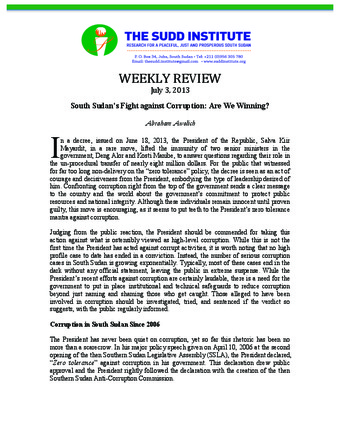
South Sudan’s Fight against Corruption: Are We Winning?
Author: Abraham Awolich
Organization: The Sudd Institute
Type: Weekly Reviews
Date: 03/07/2013
In a decree, issued on June 18, 2013, the President of the Republic, Salva Kiir Mayardit, in a rare move, lifted the immunity of two senior ministers in the government, Deng Alor and Kosti Manibe, to answer questions regarding their role in the an un-procedural transfer of nearly eight million dollars.
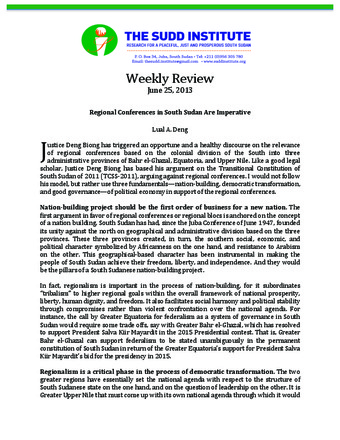
Regional Conferences in South Sudan Are Imperative
Author: Lual A. Deng
Organization: The Sudd Institute
Type: Weekly Reviews
Date: 25/06/2013
Justice Deng Biong has triggered an opportune and a healthy discourse on the relevance of regional conferences based on the colonial division of the South into three administrative provinces of Bahr el-Ghazal, Equatoria, and Upper Nile.
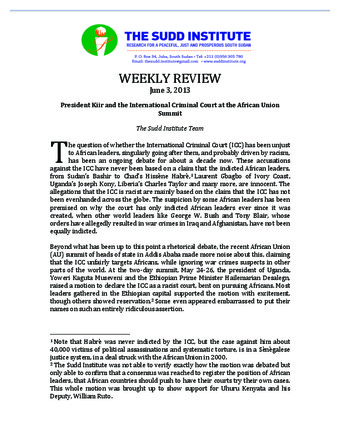
President Kiir and the International Criminal Court at the African Union Summit
Organization: The Sudd Institute
Type: Weekly Reviews
Date: 03/06/2013
The question of whether the International Criminal Court (ICC) has been unjust to African leaders, singularly going after them, and probably driven by racism, has been an ongoing debate for about a decade now. These accusations against the ICC have never been based on a claim that the indicted African...
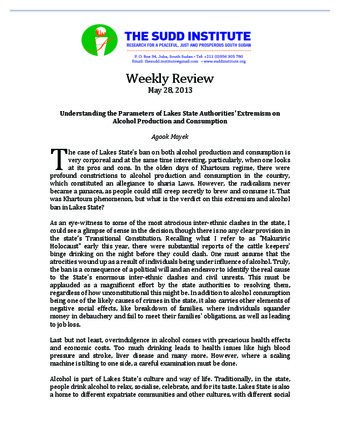
Understanding the Parameters of Lakes State Authorities' Extremism on Alcohol Production and Consumption
Author: Agook Mayek
Organization: The Sudd Institute
Type: Weekly Reviews
Date: 28/05/2013
The case of Lakes State's ban on both alcohol production and consumption is very corporeal and at the same time interesting, particularly, when one looks at its pros and cons. In the olden days of Khartoum regime, there were profound constrictions to alcohol production and consumption in the country, which...
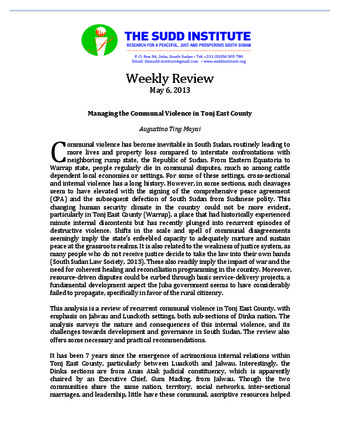
Managing the Communal Violence in Tonj East County
Author: Augustino Ting Mayai
Organization: The Sudd Institute
Type: Weekly Reviews
Date: 06/05/2013
It has been 7 years since the emergence of acrimonious internal relations within Tonj East County, particularly between Luackoth and Jalwau. Interestingly, the Dinka sections are from Anan Atak judicial constituency, which is apparently chaired by an Executive Chief, Gum Mading, from Jalwau.
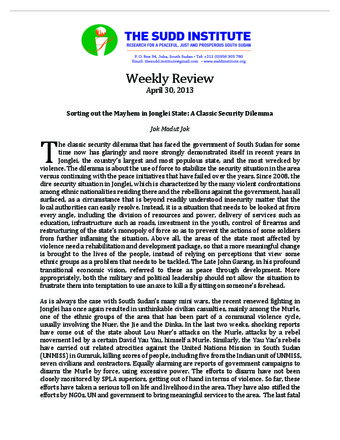
Sorting Out the Mayhem in Jonglei State: A Classic Security Dilemma
Author: Jok Madut Jok
Organization: The Sudd Institute
Type: Weekly Reviews
Date: 30/04/2013
The classic security dilemma that has faced the government of South Sudan for some time now has glaringly and more strongly demonstrated itself in recent years in Jonglei, the country’s largest and most populous state, and the most wrecked by violence.
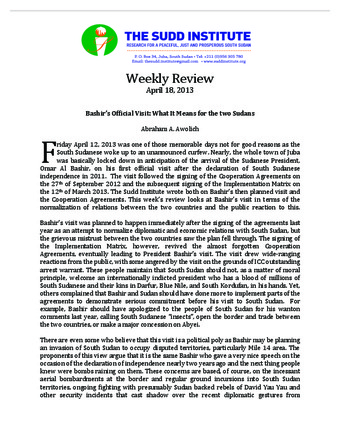
Bashir’s Official Visit: What It Means for the two Sudans
Author: Abraham Awolich
Organization: The Sudd Institute
Type: Weekly Reviews
Date: 18/04/2013
Bashir’s visit was planned to happen immediately after the signing of the agreements last year as an attempt to normalize diplomatic and economic relations with South Sudan, but the grievous mistrust between the two countries saw the plan fell through.
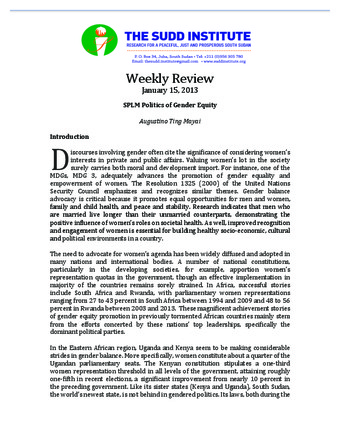
SPLM Politics of Gender Equity
Author: Augustino Ting Mayai
Organization: The Sudd Institute
Type: Weekly Reviews
Date: 10/04/2013
The need to advocate for women’s agenda has been widely diffused and adopted in many nations and international bodies. A number of national constitutions, particularly in the developing societies, for example, apportion women’s representation quotas in the government, though an effective implementation in majority of the countries remains sorely strained.
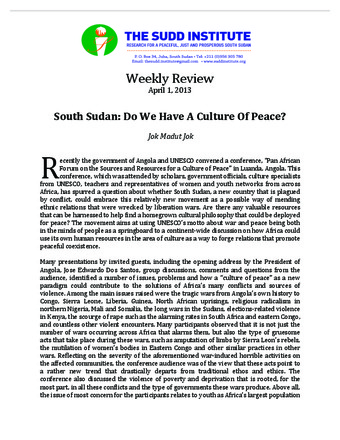
South Sudan: Do We Have a Culture of Peace?
Author: Jok Madut Jok
Organization: The Sudd Institute
Type: Weekly Reviews
Date: 01/04/2013
Recently the government of Angola and UNESCO convened a conference, “Pan African Forum on the Sources and Resources for a Culture of Peace” in Luanda, Angola. This conference, which was attended by scholars, government officials, culture specialists from UNESCO, teachers and representatives of women and youth networks from across Africa,...
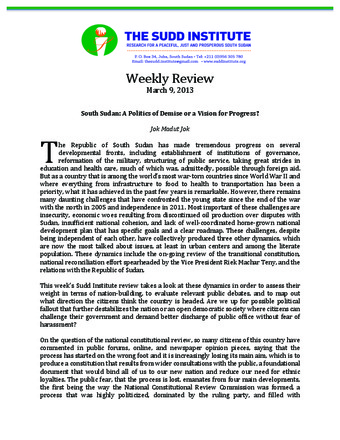
South Sudan: A Politics of Demise or a Vision for Progress?
Author: Jok Madut Jok
Organization: The Sudd Institute
Type: Weekly Reviews
Date: 09/03/2013
The Republic of South Sudan has made tremendous progress on several developmental fronts, including establishment of institutions of governance, reformation of the military, structuring of public service, taking great strides in education and health care, much of which was, admittedly, possible through foreign aid.
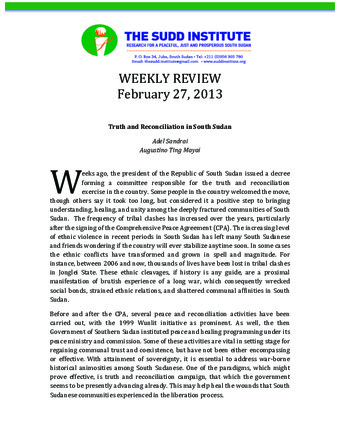
Truth and Reconciliation in South Sudan
Authors: Adel Sandrai, Augustino Ting Mayai
Organization: The Sudd Institute
Type: Weekly Reviews
Date: 27/02/2013
Weeks ago, the president of the Republic of South Sudan issued a decree forming a committee responsible for the truth and reconciliation exercise in the country. Some people in the country welcomed the move, though others say it took too long, but considered it a positive step to bringing understanding,...
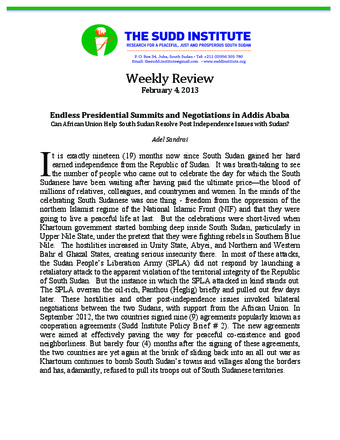
Endless Presidential Summits and Negotiations in Addis Ababa: Can African Union Help South Sudan Resolve Post Independence Issues with Sudan?
Author: Adel Sandrai
Organization: The Sudd Institute
Type: Weekly Reviews
Date: 06/02/2013
After nineteen months of independence South Sudan is nowhere near resolving post independence issues with Sudan. The cooperation agreements signed between the two countries in September 2012 have not been implemented due to pre-conditions that were not part of the terms of the signed agreements that Khartoum says must be...
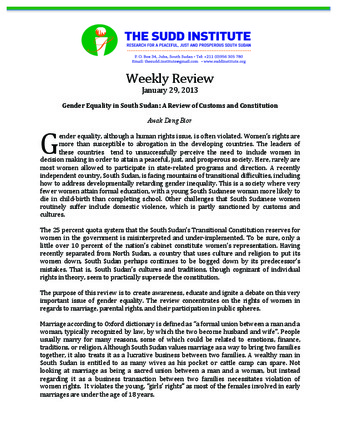
Gender Equality in South Sudan: A Review of Customs and Constitution
Author: Awak Deng Bior
Organization: The Sudd Institute
Type: Weekly Reviews
Date: 29/01/2013
Gender equality, although a human rights issue, is often violated. Women’s rights are more than susceptible to abrogation in the developing countries. The leaders of these countries tend to unsuccessfully perceive the need to include women in decision making in order to attain a peaceful, just, and prosperous society.
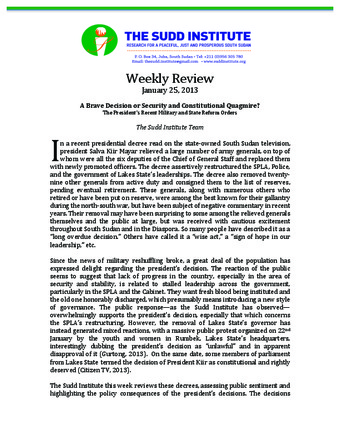
A Brave Decision or Security and Constitutional Quagmire?: The President’s Recent Military and State Reform Orders
Organization: The Sudd Institute
Type: Weekly Reviews
Date: 25/01/2013
In a recent presidential decree read on the state-owned South Sudan television, president Salva Kiir Mayar relieved a large number of army generals, on top of whom were all the six deputies of the Chief of General Staff and replaced them with newly promoted officers.
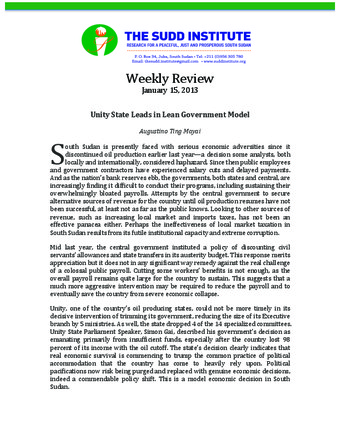
Unity State Leads in Lean Government Model
Author: Augustino Ting Mayai
Organization: The Sudd Institute
Type: Weekly Reviews
Date: 18/01/2013
South Sudan is presently faced with serious economic adversities since it discontinued oil production earlier last year—a decision some analysts, both locally and internationally, considered haphazard. Since then public employees and government contractors have experienced salary cuts and delayed payments.
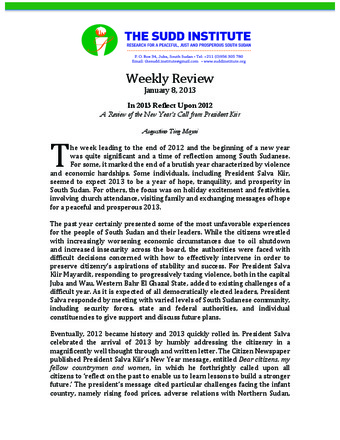
In 2013 Reflect Upon 2012: A Review of the New Year’s Call from President Kiir
Author: Augustino Ting Mayai
Organization: The Sudd Institute
Type: Weekly Reviews
Date: 08/01/2013
January 8, 2013
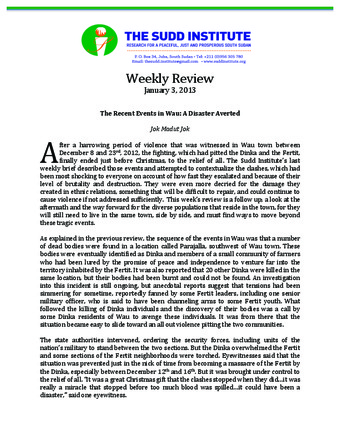
The Recent Events in Wau: A Disaster Averted
Author: Jok Madut Jok
Organization: The Sudd Institute
Type: Weekly Reviews
Date: 03/01/2013
After a harrowing period of violence that was witnessed in Wau town between December 8 and 23rd, 2012, the fighting, which had pitted the Dinka and the Fertit, finally ended just before Christmas, to the relief of all.
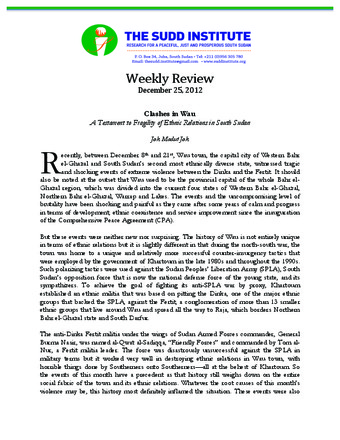
Clashes in Wau: A Testament to Fragility of Ethnic Relations in South Sudan
Author: Jok Madut Jok
Organization: The Sudd Institute
Type: Weekly Reviews
Date: 25/12/2012
Recently, between December 8th and 21st, Wau town, the capital city of Western Bahr el-Ghazal and South Sudan’s second most ethnically diverse state, witnessed tragic and shocking events of extreme violence between the Dinka and the Fertit.
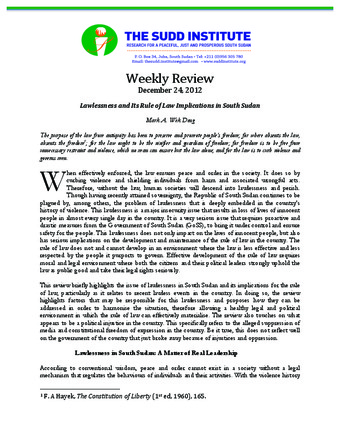
Lawlessness and Its Rule of Law Implications in South Sudan
Author: Mark A. Wek Deng
Organization: The Sudd Institute
Type: Weekly Reviews
Date: 24/12/2012
Though having recently attained sovereignty, the Republic of South Sudan continues to be plagued by, among others, the problem of lawlessness that is deeply embedded in the country’s history of violence. This lawlessness is a major insecurity issue that results in loss of lives of innocent people in almost every...
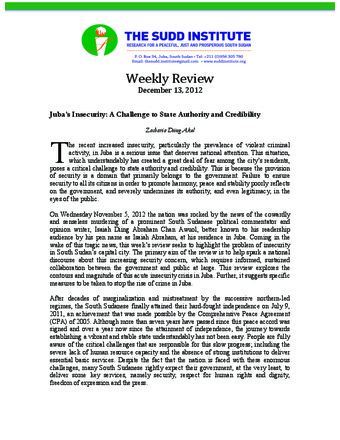
Juba’s Insecurity: A Challenge to State Authority and Credibility
Organization: The Sudd Institute
Type: Weekly Reviews
Date: 13/12/2012
Last week, the nation was rocked by the news of the cowardice and senseless murdering of a prominent South Sudanese political commentator and opinion writer, Isaiah Diing Abraham Chan Awuol, better known to his readership audience by his pen name as Isaiah Abraham, on Wednesday, 5 November 2012 at his...
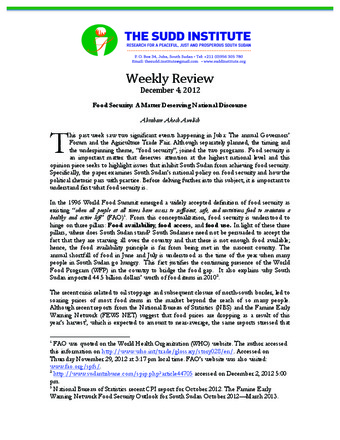
Food Security: A Matter Deserving National Discourse
Author: Abraham Awolich
Organization: The Sudd Institute
Type: Weekly Reviews
Date: 04/12/2012
This past week saw two significant events happening in Juba: The annual Governors’ Forum and the Agriculture Trade Fair. Although separately planned, the timing and the underpinning theme, “food security”, joined the two programs. Food security is an important matter that deserves attention at the highest national level and this...
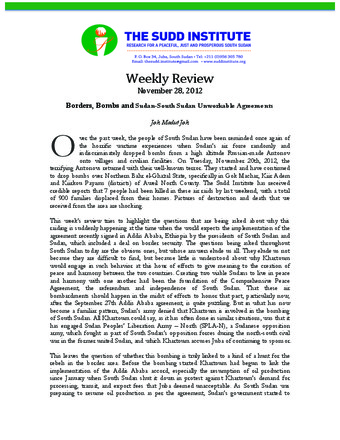
Borders, Bombs and Sudan-South Sudan Unworkable Agreements
Author: Jok Madut Jok
Organization: The Sudd Institute
Type: Weekly Reviews
Date: 28/11/2012
Over the past week, the people of South Sudan have been reminded once again of the horrific wartime experiences when Sudan’s air force randomly and indiscriminately dropped bombs from a high altitude Russian-made Antonov onto villages and civilian facilities near the Sudan-South Sudan Border.
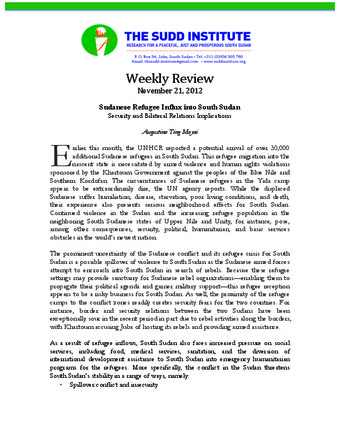
Sudanese Refugee Influx into South Sudan: Security and Bilateral Relations Implications
Author: Augustino Ting Mayai
Organization: The Sudd Institute
Type: Weekly Reviews
Date: 21/11/2012
The circumstances of Sudanese refugees in the Yida camp appear to be extraordinarily dire, the UN agency reports. While the displaced Sudanese suffer humiliation, disease, starvation, poor living conditions, and death, their experience also presents serious neighborhood effects for South Sudan.
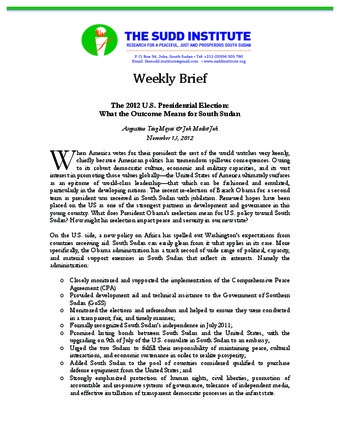
The 2012 U.S. Presidential Election: What the Outcome Means for South Sudan
Authors: Jok Madut Jok, Augustino Ting Mayai
Organization: The Sudd Institute
Type: Weekly Reviews
Date: 13/11/2012
The recent re-election of Barack Obama for a second term as president was received in South Sudan with jubilation. Renewed hopes have been placed on the US as one of the strongest partners in development and governance in this young country. What does President Obama’s reelection mean for U.S.
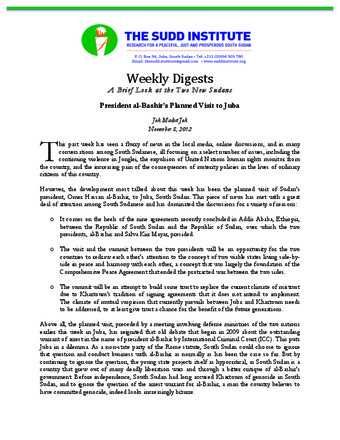
President al-Bashir’s Planned Visit to Juba
Author: Jok Madut Jok
Organization: The Sudd Institute
Type: Weekly Reviews
Date: 08/11/2012
This past week has seen a flurry of news in the local media, online discussions, and in many conversations among South Sudanese, all focusing on a select number of issues, including the continuing violence in Jonglei, the expulsion of United Nations human rights monitor from the country, and the increasing...
Operationalizing the 2023 National Elections Act: Opportunities and Challenges
Author: Joseph Geng Akech
Type: Weekly Reviews
